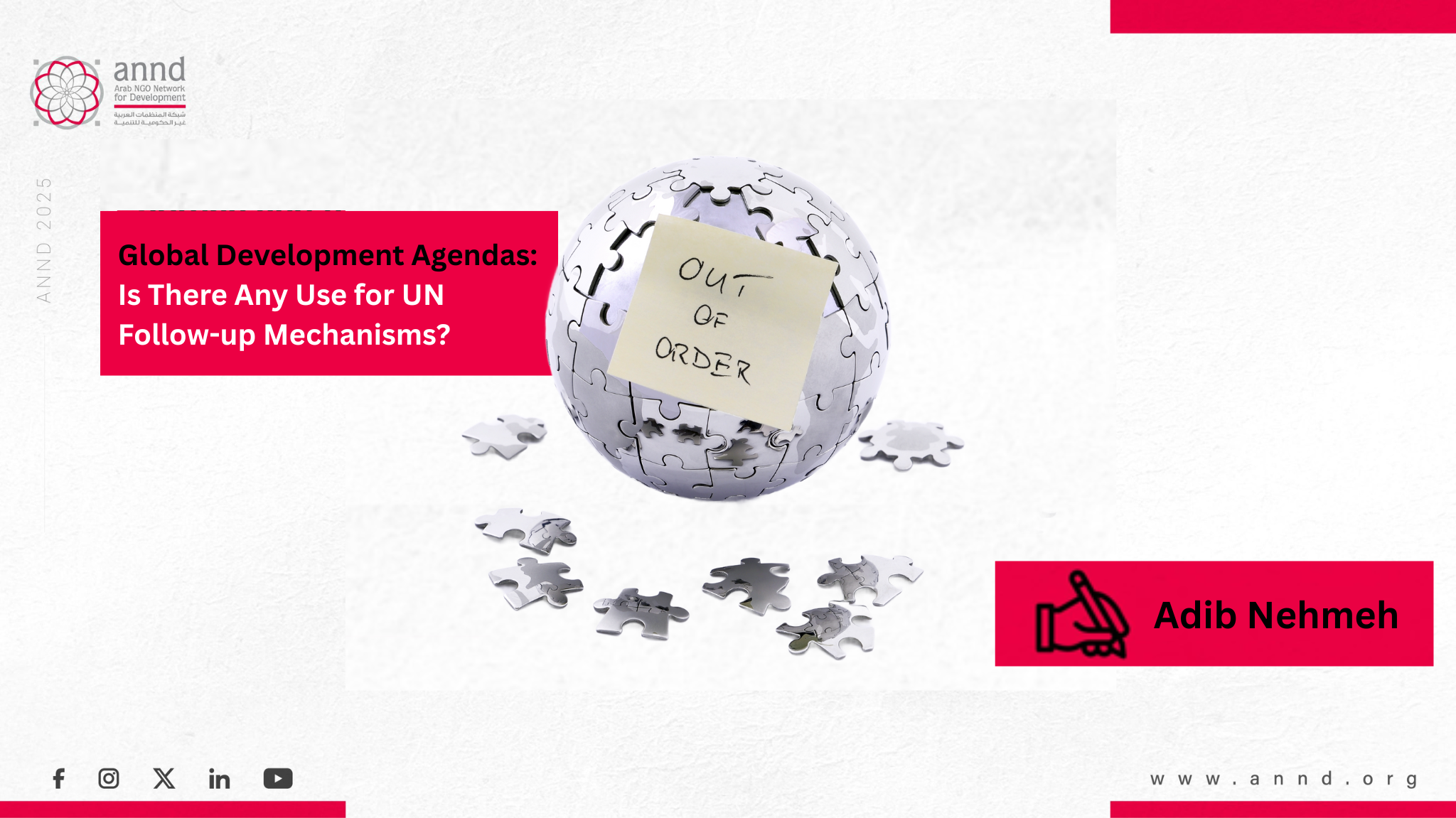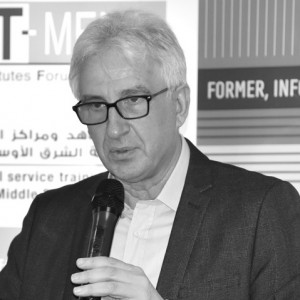Global Development Agendas: Is There Any Use for UN Follow-up Mechanisms? – Adib Nehmeh
Global development agendas, both general and sectoral, are often accompanied by mechanisms for follow-up and measuring progress achieved. The terminology used to denote that ranges between review, follow-up, monitoring, evaluation, and correction—terms that carry meanings that vary gradually between formal follow-up and critical evaluation accompanied by making the necessary corrections to paths and adjustments to the content when needed. The focus is often on using quantitative indicators to measure progress, or in the form of a checklist, which is partial by nature and weak in effectiveness when it comes to structural aspects or when it comes to measuring impact.
The matter becomes more complicated when it concerns agendas of a strategic or global nature, as in the case of CEDAW, the Convention on the Rights of the Child, the reviews before the Human Rights Council, or the current global Agenda 2030 path. And we will find diversity in the follow-up mechanisms and their effectiveness between one UN process and another, and the most effective mechanisms are those used by human rights bodies.
That is due to the fact that this path is based on a set of texts, charters, and international conventions that often have a binding character, and that they constitute a main component in international law and are linked to agreements that states sign and ratify and become binding for them. One of the reasons for that is that the entire human rights system and its mechanisms were formulated temporally since the beginnings of the formation of the United Nations, in the glow of the climate influenced by the lessons of World War II, and under an international balance different from what it is today, which had a material manifestation in three major blocs in the General Assembly and the Security Council at that stage. Civil society was able to build traditions in lobbying, advocacy, and active participation, the most prominent fields of which were general human rights, the right to self-determination, independence, liberation from colonialism, and the women’s rights movement.
With the transformations the world has gone through, these mechanisms have loosened and their effectiveness has eroded despite their continuation, but the ability to influence and compel states and governments to abide by the results of review and evaluation does not happen automatically. Governments have grown weary of these mechanisms. Erosion has also affected the UN organization itself, including the erosion that occurred in the human rights system and its binding mechanisms, in the concept of development itself, and in the shift of priorities and the developmental paradigm toward favoring the economic dimension over others, and the domination of the economic dimension over the approach to the environmental crisis, including climate change. This economic–environmental duality has taken over the entirety of the "global institutional mindset," also armed with the security–military approach that pushed itself to the forefront since the wave of the "war on terror" at the beginning of the third millennium. In such a climate, major interest holders—powerful states and giant corporations—began to feel their surplus power and flaunt it blatantly in all fields and all parts of the world. Many governments in the Third World welcomed that because it freed them from the annoying pressure coming from their peoples and from political or civil actors in their countries who were still pressing for more democracy and political, civil, economic, social, and cultural rights, and for the transformative and full implementation of general and sectoral development agendas.
Agenda 2030 for Sustainable Development embodies this shift and erosion in monitoring and evaluation mechanisms and their effectiveness, and its drift away from its actual goal represented in accompanying the implementation of the global development agenda and influencing its course during implementation, and correcting paths where necessary in real time, without waiting for the end of the agenda’s specified time frame.
As for the follow-up mechanisms themselves, the Millennium Declaration – Millennium Development Goals process did not completely exclude the term monitoring and evaluation. It also stipulated the necessity that the reports submitted by countries be national reports, not governmental reports, and requested that they involve the private sector and civil society in preparing the national report, and did not prevent civil society organizations from submitting their own reports, without adopting them in a specific institutionalized mechanism. It also adopted the peer review mechanism, where other countries could review the report submitted by a specific country. These mechanisms were not highly effective in influencing the adopted policies, but they existed.
As for the 2030 Agenda for Sustainable Development, we note the following:
1. At the level of terminology, Agenda 2030 excluded words such as monitoring and evaluation in describing the follow-up mechanisms it adopted, and used instead the terms “follow-up and review.”
2. Agenda 2030 adopted the term “Voluntary National Review” to emphasize the distancing from any form of obligation on governments to submit their reports on the progress achieved.
3. Agenda 2030 introduced an annual mechanism for review and follow-up at the global level: the “High-Level Political Forum,” where limited time is allocated for each national review session, about half an hour, most of which is for government representatives to present the report, and civil society representatives participate in these sessions by asking a question or making a comment in the two remaining minutes of discussion time.
Over the past years, manifestations of failure, shortcomings, and violations against nature and human rights and peoples have continued, as have the processes of restricting civic space (the countries of the Arab region are a flagrant example of that), and restricting the participation of civil society organizations in UN processes, including within the UN system itself.
There is the repeated inability to stop the course of climate change under the pretext of preserving the economic interests of major states and global corporations, which is blatant despite the number of annual meetings on climate and environment (COP) reaching thirty. The Seville Summit on Financing for Development, held in June and July 2025, represents an additional example of restricting civil society participation in the summit’s process and influencing its outcomes, which were below expectations and below the level of the problems facing development financing. Likewise, the current process of preparing for the second World Summit for Social Development scheduled in Qatar in November 2025 is also not promising, both in terms of content—which will be limited to a weak political declaration as appears from the latest draft—and in terms of civil society participation mechanisms and the overall procedures of preparation and convening the conference, which remain unclear until now.
If the global, regional, and national trajectory is regressive in this way, what is to be done to overcome these difficulties and to enable civil society to regain some of the influence it intermittently enjoyed since the 1990s in the context of UN processes? And how can an appropriate balance be established between maximizing the benefit from these processes and working to amend and surpass them at the same time? And is there still a possibility to influence them and achieve some benefit from using them, or has it become better to boycott them or surpass them through alternative mechanisms? And what are these alternatives?
In answering these questions, the following directions come to mind:
1. Not ignoring this reality, and confronting attempts at co-optation and limiting the approaches and positions of civil society organizations within the ceilings set by the mainstream of the system, and acknowledging that the previously more advanced and neutral contents of the United Nations and its procedures have largely eroded, and that the UN organization itself has become more affected by the choices of major donor states, and by the choices and interests of global corporations and the business community.
2. As much as the option of boycotting UN processes may seem unhelpful or impossible, the option of accepting the ceilings set either by the UN or its multiple institutions and agencies is also unhelpful. There may be subjective factors at the regional or national level that allow some progress in agendas or practices at the regional or national levels (or the opposite may occur). It is also possible to boycott some institutions or entities and confront them publicly, especially those that violate rights or impose direct political conditionalities on the work of organizations.
3. No success can be achieved if the initiatives are individual. Networking and building cross-disciplinary coalitions at the national and regional levels, and expanding international alliances, is a necessary and obligatory condition for success under the current circumstances. This must also be accompanied by progress in the positions of the majority of organizations toward a more transformative and radical approach, not contenting themselves with the role of contractor in project implementation, and accepting the risk of rejecting politically conditioned funding that contradicts national priorities.
4. Serious exploration of how to bridge the gap and remove the barriers that hinder movement, cooperation, and integration between different components of civil society, its organizations, and its forms of action: cross-sectoral and cross-specialty integration, between associations and unions of all kinds, and with social movements, and how to interact and effectively participate in popular movements that take on a political character, as in the first and second waves of the Arab Spring.
5. Serious exploration of a new developmental discourse that includes all dimensions, from a perspective more connected to society, the future, and change, including approaching the relationship between the civil and the political in the process of change from the perspective of human rights and development, leading to the realization of the right to self-determination and the right to development.
All these are ideas that could, among others, be the subject of necessary joint reflection at this stage, in order to formulate more effective strategies for transforming our world.



